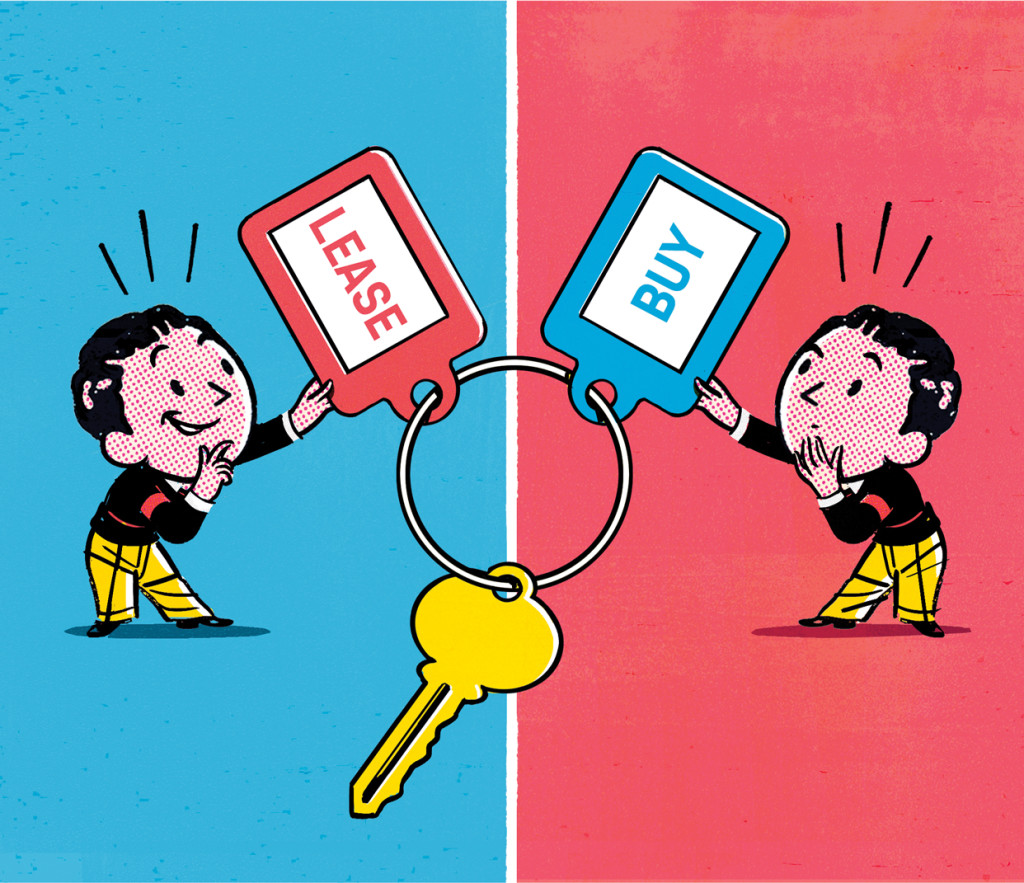Signing a lease option helps jumbo-mortgage borrowers save for a higher down payment, get their credit history in order and lock in on their dream-home purchase

Illustration: Chris Gash
A rent-to-own luxury home may help potential homeowners buy some time before it’s buying time.
For potential jumbo-mortgage borrowers, a lease option gives future buyers the opportunity to save for a higher down payment or get a credit history in order, while locking in on their future purchase, says Linda Rheinberger, a broker with Berkshire Hathaway HomeServices in Las Vegas.
On their end, sellers typically agree to a lease option as a way to cover their mortgage payments or make additional income until the sales market improves, Ms. Rheinberger adds.
Here’s how it works: In most cases, renters agree to a lease option that allows them to either buy or walk away from the property at the end of the rental term, usually two years, says Steve Goddard, a manager with Re/MAX Estate Properties in Manhattan Beach, Calif. They pay a deposit, or “option consideration,†usually no more than 2% to 2.5% of the home’s market value, he adds. The deposit will be credited toward the down payment if the home is purchased. If the renter decides not to buy, the seller keeps the deposit, Mr. Goddard says.
In some cases, the monthly rental payments will be higher than the going rate for comparable properties in the local market. That payment portion above market rate will be applied to the home purchase, says David M. Gladstone, a real-estate attorney based in White Plains, N.Y.
If a portion of rent money is to be credited to the down payment, the mortgage lender will want to see that spelled out in the contract, as well as documentation that the additional amount is in excess of fair market rental rates, says Peter Grabel, managing director of Stamford, Conn.-based Luxury Mortgage. It cannot just be a verbal or handshake agreement with the landlord/seller, he says.
Most lease-option agreements don’t set a sale price in stone and instead stipulate some measure to reflect current home values at the eventual time of the purchase, Mr. Gladstone says. Sellers/landlords used to use the consumer-price index to account for inflation, but they now often use other indicators that more directly reflect area home price growth, he adds.
In short, the lease contract should contain not just a rental agreement but also incorporate fully the future sales contract terms, Mr. Gladstone says. “The terms are worked out so a seller cannot frustrate the attempt to buy if you want to go ahead, avoiding renegotiation later,†he adds.
The lease agreement may benefit the buyer when it comes time to apply for a mortgage, Mr. Grabel says. “The fact that you are able to pay a certain amount of rent for a certain period shows the ability you will be able to pay the mortgage payment,†he adds.
Typically, jumbo mortgages require at least 20% down, a credit score of 680 or above and six months to a year or more of reserves, Mr. Grabel says. Jumbo mortgages have loan limits higher than government-backed loans—$417,000 in most places and $625,500 in some high-price areas such as San Francisco and New York City.
Many lease landlords are individual sellers, but some are investors who may own a large number of properties with lease options. During the early-to-mid 2000s, the latter category receded from this market as credit loosening made it possible for even cash-strapped borrowers to qualify for a mortgage.
However, tight postrecession lending brought some new players to enter this space. For example, rent-to-own company Home Partners of America, which was founded three years ago, purchased 320 homes in June for $100 million.
Here are a few more tips when planning to lease:
• Repair responsibility. A seller/landlord may expect a buyer/renter to be responsible for a greater share of repairs and improvements than a straight rental landlord, Ms. Rheinberger says. The contract should specify what the landlord is responsible for, including structural or storm damage, which may be covered by the homeowners’ but not renters’ insurance policies, Mr. Gladstone says.
• Inspect. A leasee should go the extra step of hiring a home inspector. The findings will influence negotiations over the future sales, Ms. Rheinberger says.
A formal appraisal may not be necessary before signing a lease option, but a renter/buyer may still wish to check values with comparable homes in the area using online data or with the help of a real-estate agent, she adds.
• Anticipate mortgage qualification. Use the leasing period to pay off a car loan to reduce debt-to-income ratio. Self-employed business owners may want to reduce their deductions on tax returns, which will later be used for income qualification, Mr. Grabel says.
Published by